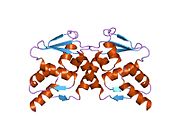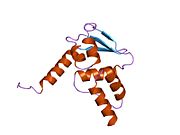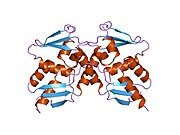BCL6: Difference between revisions
No edit summary |
|||
| Line 6: | Line 6: | ||
The protein encoded by this gene is an evolutionarily conserved [[zinc finger]] transcription factor and contains an N-terminal POZ/BTB domain. This protein acts as a sequence-specific repressor of transcription, and has been shown to modulate the STAT-dependent [[Interleukin 4]] (IL-4) responses of [[B cells]]. This protein can interact with several corepressor complexes to inhibit [[transcription (genetics)|transcription]]. This gene is found to be frequently translocated and hypermutated in [[diffuse large B cell lymphoma]] (DLBCL),<ref name="pmid8235596">{{cite journal | vauthors = Ye BH, Lista F, Lo Coco F, Knowles DM, Offit K, Chaganti RS, Dalla-Favera R | title = Alterations of a zinc finger-encoding gene, BCL-6, in diffuse large-cell lymphoma | journal = Science | volume = 262 | issue = 5134 | pages = 747–50 | date = October 1993 | pmid = 8235596 | doi = 10.1126/science.8235596 }}</ref><ref name="pmid8220427">{{cite journal | vauthors = Kerckaert JP, Deweindt C, Tilly H, Quief S, Lecocq G, Bastard C | title = LAZ3, a novel zinc-finger encoding gene, is disrupted by recurring chromosome 3q27 translocations in human lymphomas | journal = Nature Genetics | volume = 5 | issue = 1 | pages = 66–70 | date = September 1993 | pmid = 8220427 | doi = 10.1038/ng0993-66 }}</ref><ref name="pmid8618933">{{cite journal | vauthors = Migliazza A, Martinotti S, Chen W, Fusco C, Ye BH, Knowles DM, Offit K, Chaganti RS, Dalla-Favera R | title = Frequent somatic hypermutation of the 5' noncoding region of the BCL6 gene in B-cell lymphoma | journal = Proceedings of the National Academy of Sciences of the United States of America | volume = 92 | issue = 26 | pages = 12520–4 | date = December 1995 | pmid = 8618933 | pmc = 40389 | doi = 10.1073/pnas.92.26.12520 }}</ref> and contributes to the pathogenesis of DLBCL. An exon 7 skipping splice variant encodes a shorter form of the protein which lacks the first two zinc fingers of the [[DNA binding domain]].<ref name="pmid18675787">{{cite journal | vauthors = Shen Y, Ge B, Ramachandrareddy H, McKeithan T, Chan WC | title = Alternative splicing generates a short BCL6 (BCL6S) isoform encoding a compact repressor | journal = Biochemical and Biophysical Research Communications | volume = 375 | issue = 2 | pages = 190–3 | date = October 2008 | pmid = 18675787 | pmc = 2573862 | doi = 10.1016/j.bbrc.2008.07.116 }}</ref> |
The protein encoded by this gene is an evolutionarily conserved [[zinc finger]] transcription factor and contains an N-terminal POZ/BTB domain. This protein acts as a sequence-specific repressor of transcription, and has been shown to modulate the STAT-dependent [[Interleukin 4]] (IL-4) responses of [[B cells]]. This protein can interact with several corepressor complexes to inhibit [[transcription (genetics)|transcription]]. This gene is found to be frequently translocated and hypermutated in [[diffuse large B cell lymphoma]] (DLBCL),<ref name="pmid8235596">{{cite journal | vauthors = Ye BH, Lista F, Lo Coco F, Knowles DM, Offit K, Chaganti RS, Dalla-Favera R | title = Alterations of a zinc finger-encoding gene, BCL-6, in diffuse large-cell lymphoma | journal = Science | volume = 262 | issue = 5134 | pages = 747–50 | date = October 1993 | pmid = 8235596 | doi = 10.1126/science.8235596 }}</ref><ref name="pmid8220427">{{cite journal | vauthors = Kerckaert JP, Deweindt C, Tilly H, Quief S, Lecocq G, Bastard C | title = LAZ3, a novel zinc-finger encoding gene, is disrupted by recurring chromosome 3q27 translocations in human lymphomas | journal = Nature Genetics | volume = 5 | issue = 1 | pages = 66–70 | date = September 1993 | pmid = 8220427 | doi = 10.1038/ng0993-66 }}</ref><ref name="pmid8618933">{{cite journal | vauthors = Migliazza A, Martinotti S, Chen W, Fusco C, Ye BH, Knowles DM, Offit K, Chaganti RS, Dalla-Favera R | title = Frequent somatic hypermutation of the 5' noncoding region of the BCL6 gene in B-cell lymphoma | journal = Proceedings of the National Academy of Sciences of the United States of America | volume = 92 | issue = 26 | pages = 12520–4 | date = December 1995 | pmid = 8618933 | pmc = 40389 | doi = 10.1073/pnas.92.26.12520 }}</ref> and contributes to the pathogenesis of DLBCL. An exon 7 skipping splice variant encodes a shorter form of the protein which lacks the first two zinc fingers of the [[DNA binding domain]].<ref name="pmid18675787">{{cite journal | vauthors = Shen Y, Ge B, Ramachandrareddy H, McKeithan T, Chan WC | title = Alternative splicing generates a short BCL6 (BCL6S) isoform encoding a compact repressor | journal = Biochemical and Biophysical Research Communications | volume = 375 | issue = 2 | pages = 190–3 | date = October 2008 | pmid = 18675787 | pmc = 2573862 | doi = 10.1016/j.bbrc.2008.07.116 }}</ref> |
||
Physiologically, BCL6 is a master transcription factor which leads the differentiation of naive helper T cells in [[Follicular B Helper T cells|Follicular Helper T cells]] (TFH cells).<ref>{{cite journal | vauthors = Nurieva RI, Chung Y, Martinez GJ, Yang XO, Tanaka S, Matskevitch TD, Wang YH, Dong C | title = Bcl6 mediates the development of T follicular helper cells | journal = Science | volume = 325 | issue = 5943 | pages = 1001–5 | date = August 2009 | pmid = 19628815 | doi = 10.1126/science.1176676 | pmc=2857334}}</ref> Its action is negatively regulated by the gene [[PRDM1]] encoding the transcription factor Blimp-1.<ref>{{cite journal | vauthors = Johnston RJ, Poholek AC, DiToro D, Yusuf I, Eto D, Barnett B, Dent AL, Craft J, Crotty S | title = Bcl6 and Blimp-1 are reciprocal and antagonistic regulators of T follicular helper cell differentiation | journal = Science | volume = 325 | issue = 5943 | pages = 1006–10 | date = August 2009 | pmid = 19608860 | doi = 10.1126/science.1175870 | pmc=2766560}}</ref> |
Physiologically, BCL6 is a master transcription factor which leads the differentiation of naive helper T cells in [[Follicular B Helper T cells|Follicular Helper T cells]] (TFH cells).<ref>{{cite journal | vauthors = Nurieva RI, Chung Y, Martinez GJ, Yang XO, Tanaka S, Matskevitch TD, Wang YH, Dong C | title = Bcl6 mediates the development of T follicular helper cells | journal = Science | volume = 325 | issue = 5943 | pages = 1001–5 | date = August 2009 | pmid = 19628815 | doi = 10.1126/science.1176676 | pmc=2857334}}</ref> Its action is negatively regulated by the gene [[PRDM1]] encoding the transcription factor Blimp-1.<ref>{{cite journal | vauthors = Johnston RJ, Poholek AC, DiToro D, Yusuf I, Eto D, Barnett B, Dent AL, Craft J, Crotty S | title = Bcl6 and Blimp-1 are reciprocal and antagonistic regulators of T follicular helper cell differentiation | journal = Science | volume = 325 | issue = 5943 | pages = 1006–10 | date = August 2009 | pmid = 19608860 | doi = 10.1126/science.1175870 | pmc=2766560}}</ref> |
||
BCL6 can be effectively silenced by siRNA knockdown for further analysis based on an independent validation.<ref>{{Cite journal|last=Munkácsy|first=Gyöngyi|last2=Sztupinszki|first2=Zsófia|last3=Herman|first3=Péter|last4=Bán|first4=Bence|last5=Pénzváltó|first5=Zsófia|last6=Szarvas|first6=Nóra|last7=Győrffy|first7=Balázs|date=2016-01-01|title=Validation of RNAi Silencing Efficiency Using Gene Array Data shows 18.5% Failure Rate across 429 Independent Experiments|url=http://linkinghub.elsevier.com/retrieve/pii/S2162253117300859|journal=Molecular Therapy - Nucleic Acids|language=English|volume=5|doi=10.1038/mtna.2016.66|issn=2162-2531|pmc=PMC5056990|pmid=27673562}}</ref> |
|||
==Diagnostic utility== |
==Diagnostic utility== |
||
Revision as of 06:56, 8 June 2017
B-cell lymphoma 6 protein is a protein that in humans is encoded by the BCL6 gene.[5] Like BCL2, BCL3, BCL5, BCL7A, BCL9, and BCL10, it has clinical significance in lymphoma.
Function
The protein encoded by this gene is an evolutionarily conserved zinc finger transcription factor and contains an N-terminal POZ/BTB domain. This protein acts as a sequence-specific repressor of transcription, and has been shown to modulate the STAT-dependent Interleukin 4 (IL-4) responses of B cells. This protein can interact with several corepressor complexes to inhibit transcription. This gene is found to be frequently translocated and hypermutated in diffuse large B cell lymphoma (DLBCL),[6][7][8] and contributes to the pathogenesis of DLBCL. An exon 7 skipping splice variant encodes a shorter form of the protein which lacks the first two zinc fingers of the DNA binding domain.[9]
Physiologically, BCL6 is a master transcription factor which leads the differentiation of naive helper T cells in Follicular Helper T cells (TFH cells).[10] Its action is negatively regulated by the gene PRDM1 encoding the transcription factor Blimp-1.[11]
BCL6 can be effectively silenced by siRNA knockdown for further analysis based on an independent validation.[12]
Diagnostic utility
The presence of BCL6 can be demonstrated in tissue sections using immunohistochemistry. It is exclusively present in the B-cells of both healthy and neoplastic germinal centres. It therefore demonstrates both reactive hyperplasia in lymph nodes and a range of lymphomas derived from follicular B-cells, such as Burkitt's lymphoma, follicular lymphoma, and the nodular lymphocyte predominant subtype of Hodgkin's disease. It is often used together with antibodies to Bcl-2 antigen to distinguish neoplastic follicles from those found in benign hyperplasia, for which Bcl-2 is negative.[13]
Interactions
BCL6 has been shown to interact with
See also
References
- ^ a b c GRCh38: Ensembl release 89: ENSG00000113916 – Ensembl, May 2017
- ^ a b c GRCm38: Ensembl release 89: ENSMUSG00000022508 – Ensembl, May 2017
- ^ "Human PubMed Reference:". National Center for Biotechnology Information, U.S. National Library of Medicine.
- ^ "Mouse PubMed Reference:". National Center for Biotechnology Information, U.S. National Library of Medicine.
- ^ "Entrez Gene: BCL6 B-cell CLL/lymphoma 6 (zinc finger protein 51)".
- ^ Ye BH, Lista F, Lo Coco F, Knowles DM, Offit K, Chaganti RS, Dalla-Favera R (October 1993). "Alterations of a zinc finger-encoding gene, BCL-6, in diffuse large-cell lymphoma". Science. 262 (5134): 747–50. doi:10.1126/science.8235596. PMID 8235596.
- ^ Kerckaert JP, Deweindt C, Tilly H, Quief S, Lecocq G, Bastard C (September 1993). "LAZ3, a novel zinc-finger encoding gene, is disrupted by recurring chromosome 3q27 translocations in human lymphomas". Nature Genetics. 5 (1): 66–70. doi:10.1038/ng0993-66. PMID 8220427.
- ^ Migliazza A, Martinotti S, Chen W, Fusco C, Ye BH, Knowles DM, Offit K, Chaganti RS, Dalla-Favera R (December 1995). "Frequent somatic hypermutation of the 5' noncoding region of the BCL6 gene in B-cell lymphoma". Proceedings of the National Academy of Sciences of the United States of America. 92 (26): 12520–4. doi:10.1073/pnas.92.26.12520. PMC 40389. PMID 8618933.
- ^ Shen Y, Ge B, Ramachandrareddy H, McKeithan T, Chan WC (October 2008). "Alternative splicing generates a short BCL6 (BCL6S) isoform encoding a compact repressor". Biochemical and Biophysical Research Communications. 375 (2): 190–3. doi:10.1016/j.bbrc.2008.07.116. PMC 2573862. PMID 18675787.
- ^ Nurieva RI, Chung Y, Martinez GJ, Yang XO, Tanaka S, Matskevitch TD, Wang YH, Dong C (August 2009). "Bcl6 mediates the development of T follicular helper cells". Science. 325 (5943): 1001–5. doi:10.1126/science.1176676. PMC 2857334. PMID 19628815.
- ^ Johnston RJ, Poholek AC, DiToro D, Yusuf I, Eto D, Barnett B, Dent AL, Craft J, Crotty S (August 2009). "Bcl6 and Blimp-1 are reciprocal and antagonistic regulators of T follicular helper cell differentiation". Science. 325 (5943): 1006–10. doi:10.1126/science.1175870. PMC 2766560. PMID 19608860.
- ^ Munkácsy, Gyöngyi; Sztupinszki, Zsófia; Herman, Péter; Bán, Bence; Pénzváltó, Zsófia; Szarvas, Nóra; Győrffy, Balázs (2016-01-01). "Validation of RNAi Silencing Efficiency Using Gene Array Data shows 18.5% Failure Rate across 429 Independent Experiments". Molecular Therapy - Nucleic Acids. 5. doi:10.1038/mtna.2016.66. ISSN 2162-2531. PMC 5056990. PMID 27673562.
{{cite journal}}: CS1 maint: PMC format (link) - ^ Leong, Anthony S-Y; Cooper, Kumarason; Leong, F Joel W-M (2003). Manual of Diagnostic Cytology (2nd ed.). Greenwich Medical Media, Ltd. p. 29. ISBN 1-84110-100-1.
- ^ a b Huynh KD, Fischle W, Verdin E, Bardwell VJ (July 2000). "BCoR, a novel corepressor involved in BCL-6 repression". Genes & Development. 14 (14): 1810–23. doi:10.1101/gad.14.14.1810. PMC 316791. PMID 10898795.
- ^ Vasanwala FH, Kusam S, Toney LM, Dent AL (August 2002). "Repression of AP-1 function: a mechanism for the regulation of Blimp-1 expression and B lymphocyte differentiation by the B cell lymphoma-6 protooncogene". Journal of Immunology. 169 (4): 1922–9. doi:10.4049/jimmunol.169.4.1922. PMID 12165517.
- ^ a b David G, Alland L, Hong SH, Wong CW, DePinho RA, Dejean A (May 1998). "Histone deacetylase associated with mSin3A mediates repression by the acute promyelocytic leukemia-associated PLZF protein". Oncogene. 16 (19): 2549–56. doi:10.1038/sj.onc.1202043. PMID 9627120.
- ^ a b Deltour S, Guerardel C, Leprince D (December 1999). "Recruitment of SMRT/N-CoR-mSin3A-HDAC-repressing complexes is not a general mechanism for BTB/POZ transcriptional repressors: the case of HIC-1 and gammaFBP-B". Proceedings of the National Academy of Sciences of the United States of America. 96 (26): 14831–6. doi:10.1073/pnas.96.26.14831. PMC 24733. PMID 10611298.
- ^ a b c Lemercier C, Brocard MP, Puvion-Dutilleul F, Kao HY, Albagli O, Khochbin S (June 2002). "Class II histone deacetylases are directly recruited by BCL6 transcriptional repressor". The Journal of Biological Chemistry. 277 (24): 22045–52. doi:10.1074/jbc.M201736200. PMID 11929873.
{{cite journal}}: CS1 maint: unflagged free DOI (link) - ^ Gupta S, Jiang M, Anthony A, Pernis AB (December 1999). "Lineage-specific modulation of interleukin 4 signaling by interferon regulatory factor 4". The Journal of Experimental Medicine. 190 (12): 1837–48. doi:10.1084/jem.190.12.1837. PMC 2195723. PMID 10601358.
- ^ a b Wong CW, Privalsky ML (October 1998). "Components of the SMRT corepressor complex exhibit distinctive interactions with the POZ domain oncoproteins PLZF, PLZF-RARalpha, and BCL-6". The Journal of Biological Chemistry. 273 (42): 27695–702. doi:10.1074/jbc.273.42.27695. PMID 9765306.
{{cite journal}}: CS1 maint: unflagged free DOI (link) - ^ Davies JM, Hawe N, Kabarowski J, Huang QH, Zhu J, Brand NJ, Leprince D, Dhordain P, Cook M, Morriss-Kay G, Zelent A (January 1999). "Novel BTB/POZ domain zinc-finger protein, LRF, is a potential target of the LAZ-3/BCL-6 oncogene". Oncogene. 18 (2): 365–75. doi:10.1038/sj.onc.1202332. PMID 9927193.
- ^ Oestreich KJ, Huang AC, Weinmann AS (May 2011). "The lineage-defining factors T-bet and Bcl-6 collaborate to regulate Th1 gene expression patterns". The Journal of Experimental Medicine. 208 (5): 1001–13. doi:10.1084/jem.20102144. PMC 3092354. PMID 21518797.
- ^ Dhordain P, Albagli O, Honore N, Guidez F, Lantoine D, Schmid M, The HD, Zelent A, Koken MH (December 2000). "Colocalization and heteromerization between the two human oncogene POZ/zinc finger proteins, LAZ3 (BCL6) and PLZF". Oncogene. 19 (54): 6240–50. doi:10.1038/sj.onc.1203976. PMID 11175338.
Further reading
- Ueda C, Akasaka T, Ohno H (July 2002). "Non-immunoglobulin/BCL6 gene fusion in diffuse large B-cell lymphoma: prognostic implications". Leukemia & Lymphoma. 43 (7): 1375–81. doi:10.1080/10428190290033305. PMID 12389616.
- Niu H (December 2002). "The proto-oncogene BCL-6 in normal and malignant B cell development". Hematological Oncology. 20 (4): 155–66. doi:10.1002/hon.689. PMID 12469325.
- Tokuhisa T (December 2002). "[A role for Bcl6 in immune memory development]". Tanpakushitsu Kakusan Koso. Protein, Nucleic Acid, Enzyme. 47 (16 Suppl): 2306–12. PMID 12518453.
- Ohno H (April 2004). "Pathogenetic role of BCL6 translocation in B-cell non-Hodgkin's lymphoma". Histology and Histopathology. 19 (2): 637–50. PMID 15024721.
- Pasqualucci L, Bereshchenko O, Bereschenko O, Niu H, Klein U, Basso K, Guglielmino R, Cattoretti G, Dalla-Favera R (2004). "Molecular pathogenesis of non-Hodgkin's lymphoma: the role of Bcl-6". Leukemia & Lymphoma. 44 Suppl 3: S5-12. doi:10.1080/10428190310001621588. PMID 15202519.
- Jardin F, Ruminy P, Bastard C, Tilly H (February 2007). "The BCL6 proto-oncogene: a leading role during germinal center development and lymphomagenesis". Pathologie-Biologie. 55 (1): 73–83. doi:10.1016/j.patbio.2006.04.001. PMID 16815642.
External links
- BCL6+protein,+human at the U.S. National Library of Medicine Medical Subject Headings (MeSH)
- Human BCL6 genome location and BCL6 gene details page in the UCSC Genome Browser.
This article incorporates text from the United States National Library of Medicine, which is in the public domain.










